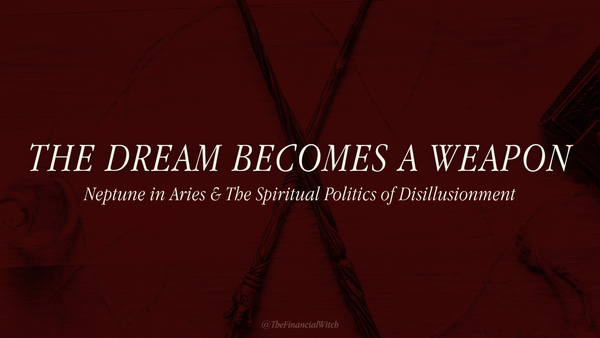Many Selves: Internal Family Systems and the 4th House
There are many routes you can take when returning home to yourself
I have never felt like a whole person.
For as long as I can remember, my insides have been filled with a cacophony of voices, many of them seemingly at odds with each other, all of them vying for the privilege of driving the car (my brain). Sometimes, one of these voices gets to drive the car—make decisions—for weeks or months at a time. But most of the time, the question of who is in charge has a different answer by the day, sometimes by the hour.
Before I could name it, I knew that all of these voices were me. I could feel that in my body. They were all different versions of me, but even the sum of their parts never felt like it added up to one whole, complete, cohesive me.
In my twenties, when I fell down the rabbit hole of self-improvement and manifestation via an MLM I spent 5 years in, I thought I had found a name for these conflicting voices. I finally felt relief, knowing I could put a finger on what I’d been experiencing for the majority of my life.
I called it “self-sabotage.”
Of course! That’s what it was! I was trying to predict the outcome of a situation because the unknown heaven is scarier than the known hell, so the times when I made choices even I didn’t understand were just me subconsciously sabotaging myself so that I could remain in my loop of predictability and struggle. It was comfortable to me to struggle, and I needed to improve myself so that I was no longer comfortable with struggle. I was meant to become comfortable with ease and success and abundance, not lack or fear or mediocrity.
In short, I simply was my own biggest problem, and I needed to be fixed. It gave me a project. Something to do. It allowed me to tap into self-compassion for the first time in my life by telling myself, “You’re sabotaging to keep yourself safe. It’s natural for you to lean into what’s familiar. You just haven’t experienced this new version of safe yet. Keep going and you’ll get there.”
Just keep going.
Be consistent.
One percent better every day.
The only thing you need in order to succeed is consistency.
Say your affirmations every day, eventually you won’t feel like you’re lying to yourself.
It takes three weeks to form a new habit.
You can change your life with just 6 months of consistency.
The only thing standing in your way is you.
If you can’t be consistent for 90 days, you won’t succeed at anything.
Don’t ever, ever, ever give up.
The “coaching and mentorship” environment I was steeped in set me up perfectly to believe all of my problems and inconsistencies were due to self-sabotage.
Nobody ever stopped to ask me why my brain was seemingly working so hard to foil any “progress” I had made, why I was so “afraid” of success. And I don’t blame them. They weren’t trained professionals. They weren’t therapists. They were just people, maybe a few rungs up the ladder from me, but all of us on the same ladder regardless.
Shortly after I left that MLM, in 2020, I dug deeper into my astrological studies than I ever had before. Shocking turn of events, I know. But prior to 2018, I had never actually seen my own birth chart, only heard tidbits about it from my godmother’s mother, who makes hand-drawn birth charts for all the babies that are born in her family.
The first thing that stands out about my natal chart is the pileup of planets in the 4th house. I knew the 4th house was about family and traditions, which was puzzling to me. I had a family, but had never felt super close to them, and “traditional” is not a word that anyone who knows me would ever use to describe me.
It’s a common complaint I hear from other 4th housers: the information available in books and online provides a very narrow view of the 4th house. It’s mostly about fathers and land and death and core psychological needs. Our foundations. Our ancestry. And that’s all fine and good, but if none of those topics are relevant, then it leaves many folks feeling discouraged and further confused about the significance of their 4th house placements.
Between 2022 and 2024, I consulted with more than 80 people in 4th house-focused natal chart readings. The patterns and observations that emerged from these sessions completely revolutionized my understanding of the 4th house, as well as confirmed many hypotheses I had formed about the 4th house—one in particular being my hypotheses that it’s not only our ancestors who linger in this subterranean space, but our former selves as well, and all of the lives that go unlived over the course of a single human lifetime. Think Sylvia Plath’s fig tree. All of the fallen figs are hanging out in your 4th house.
I saw my life branching out before me like the green fig tree in the story. From the tip of every branch, like a fat purple fig, a wonderful future beckoned and winked. One fig was a husband and a happy home and children, and another fig was a famous poet and another fig was a brilliant professor, and another fig was Ee Gee, the amazing editor, and another fig was Europe and Africa and South America, and another fig was Constantin and Socrates and Attila and a pack of other lovers with queer names and offbeat professions, and another fig was an Olympic lady crew champion, and beyond and above these figs were many more figs I couldn't quite make out. I saw myself sitting in the crotch of this fig tree, starving to death, just because I couldn't make up my mind which of the figs I would choose. I wanted each and every one of them, but choosing one meant losing all the rest, and, as I sat there, unable to decide, the figs began to wrinkle and go black, and, one by one, they plopped to the ground at my feet.
The 4th house is, I would dare to say, moreso about the past than it is about simply your biological family or your childhood (although childhood is in the past for most of us). And when people are courageous enough to begin 4th house work, they often find that those many versions of themselves are simply there as a type of guide or counsel, much like the way some folks work with their ancestors.
There’s wisdom in your 5-year-old self and your 12-year-old self and your 21-year-old self and all the selves who never came to fruition. They’re there, accessible through the 4th house, to speak to you and offer you their perspectives. Sometimes, they might speak extra loudly. Sometimes, the things they say or the advice they offer can be wrong. Or, such as in my case, all of these selves may feel like they’re at war with one another, each one vying for the chance to drive the car.
Another way to describe this would be internal family systems. This therapy model was coined by Richard Schwartz in the 1980s and is rooted in the idea of the multiplicity of the psyche, which recognizes the existence of various substructures within the psyche, akin to Freud's id, ego, and superego, as well as Jung's archetypes and complexes. Schwartz's theory posits the existence of internal "parts" or "subpersonalities" within each individual, whose interactions shape their inner world.
When I first learned about this therapy model, I immediately felt a sense of familiarity in my body. Like, without even knowing what it was (outside of its name), I understood how and why it worked. I had done plenty of hours of talk therapy throughout my teens and early twenties, and while there were some benefits to those experiences, it never seemed to address the whole of me (later, in my own experiences with IFS therapy, I recognized that there is a huge part of me that intellectualizes and can talk about almost anything at length to avoid addressing anything of true consequence).
Upon further exploration, I’ve noticed several common threads and themes between what I have been calling “4th house work,” which is the work of returning home to yourself and creating a safe inner world, and internal family systems, which is sometimes referred to as “parts work”.
- Time travel: 4th house work and parts work both require you to visit your past selves, seek their wisdom, and occasionally reparent them. Astrology in general is a study of time, and the 4th house is where you go when you’re referencing your personal past or the legacies that have formed you. In parts work, sometimes your parts can be very young, and they can form as a result of the developmental freeze that occurs at a point of past trauma. Either way, you’re delving deep into the past and engaging with your former selves whenever you engage with either of these modalities.
- Integration of the self: Through astrology, you can conceptualize your individual placements as the various parts of yourself that express themselves at different times and in different ways, just as you can with your different internal parts. Some choose to make it their goal to integrate their astrological placements by embodying all of their best qualities, and some people choose to do parts work for the purpose of allowing their truest, most compassionate self to take a permanent seat in the driver’s position.
- Inner worlds: Sometimes, these types of self-exploration can be referred to as depth work, because in all cases, you’re going deep into yourself. You’re returning to yourself, even. There’s something deeply poignant about connecting with your inner child or inner teenager and feeling a sense of homecoming or return. The “home” aspect of that comes from intentionally exploring, developing, and creating your inner worlds, something that is accessible through both 4th house work and parts work.
You don’t have to have a lot of (or any) 4th house placements to do 4th house work or explore IFS therapy. I also don’t think one can fully replace the other, but working with them in tandem could have many benefits.
Gold Nuggets is a reader-supported publication. To receive new posts and support my work, consider becoming a free or paid subscriber.
The concept of self-sabotage isn’t incorrect or wrong. It simply wasn’t helping me the way I thought it was. In reality, there were several parts of myself that simply did not feel safe when I was trying new things and attempting to wire my brain for maximum productivity and constant self-improvement—not to mention, I didn’t even know that I had Autism or ADHD back then. That’s a whole other can of worms, though.
Telling myself that I was subconsciously sabotaging any chance I had at stability wasn’t helping me to trust myself. In fact, it was leading me in the opposite direction. How can I trust myself to make the right decisions or handle the demands of my life when the story I’ve accepted about myself is that my brain will automatically attempt to ruin anything I do? How does that promote cohesion between the conflicting voices, my parts, and lead me closer to my most authentic expression?
Learning about my natal chart and exploring the 4th house (thank you to all the brave and powerful souls who have allowed me to be the light in the basement for them) has helped me trust myself more by controlling the things I actually do have control over, and not trying to take responsibility anywhere it’s not asked of me.
Many things about your life are predetermined, but that doesn’t mean you don’t have free will. Exploring your 4th house allows you to identify the inevitable, those parts of you which cannot change—like your family of origin or the stories that shaped your identity or the things that happened to you as a child—and focus your energy on the things that can be changed.
When doing parts work, you also must confront the things about your life that are unchangeable, and address the parts of you who are determined to make decisions on your behalf. It’s not about fixing anything or silencing anyone, but creating a safe place within yourself for all of those parts to feel heard and cared for. An inner sanctum, a private world, a cerebral fortress.
The things about me that are unchangeable are also the foundations upon which my life has unfolded—even if some of those foundations are shaky or traumatic. The parts of me that exist within, my many selves, are there to protect me—even if I don’t always agree with their methods.
I love myself, and I love my life. Therefore, I embrace the many conflicting voices within me that all want to drive the car. I offer them love and compassion and patience and discipline. I explain to some of them that they aren’t old enough to drive, but that doesn’t mean their voices won’t be heard.
Thank you for reading. My 4th house guidebook, Homecoming, is available now.




